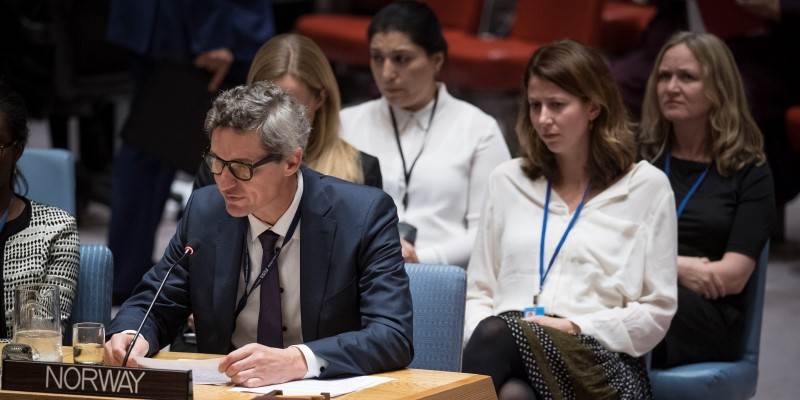Mr President,
I have the honour of making this statement on behalf of the Nordic countries: Denmark, Finland, Iceland, Sweden, and my own country, Norway.
This is no time to slow down our efforts for women, peace and security. While hope is rising in some regions, new crises are emerging elsewhere. The persistent and recurring human suffering resulting from war is a call to action; the fear and distress, the displaced people, educations and livelihoods lost. With them, the foundation for a new future.
Experience has taught us that there is no sustainable peace without the participation of women. We will not succeed unless our approach is gender responsive. Women’s and girls’ rights are often targeted, their security compromised even before a conflict erupts, violations persisting long after other violence has ceased.
Although the Secretary-General’s report describes many positive developments, there are several trends that we note with concern.
- The decrease in women’s participation in mediation last year – after years of steady progress;
- the decline in requests for and inclusion of gender expertise; and
- the decline in gender-sensitive provisions in peace agreements.
Hard-won gains must be sustained. It is up to us to see that they are.
A global women, peace and security index was launched yesterday. For the first time, we have combined data on women’s inclusion, access to justice and security. Our hope is that this index will enable us to target interventions more effectively.
Over the past 17 years, a great deal of normative work has been done. And a good deal has also been done in terms of implementation. What is needed now is more strategic and consistent implementation.
Overall, women have become more influential in peace processes, both at the negotiating table and as part of parallel initiatives. Colombia and Syria are noteworthy, but important strides are also being made in countries like Yemen and the Philippines.
We are developing new methodology and including civil society more systematically. We commend the efforts of UN Women, the UN Department for Political Affairs, committed special envoys.
However, the question remains: are we learning from one process to the next?
The different Groups of Friends play an important part, including the new group on the prevention of violent extremism, giving particular attention to the participation of women and the roles of young women and men. The Women Mediators Networks make it possible for those involved to share their experience and skills. The National Focal Points Initiative is proving helpful.The Nordic countries have joined forces for women, peace and security. The Nordic and Baltic coordinators will meet annually to improve coordination, implementation of national action plans and sharing in our region.
However, more is required if we are to ensure that we learn across countries and regions, from our successes and our failures alike.
Civil society is being consulted in new ways. The NGO Working Group provides essential information. The Global Solutions Exchange platform shares insights we need.
Yet our approach to women, peace and security is often too generic, lacks contextual analyses and concrete points of action. The establishment of the informal expert group for the Security Council was an important step in the right direction.
The fact that women can play a destructive role in conflict is no longer ignored, as demonstrated in the work to prevent violent extremism. Gender is recognised to be about men and masculinities as well. We acknowledge that men can also be victims of sexual violence.
Even so, stereotypes persist and influence far too much of our work.
The powerful leadership of women in brokering peace is now better understood and promoted across regions and organisations.
Yet local women peace brokers are often ignored when a process moves to the national or international level. Women human rights defenders often remain unprotected; abuses underreported, our response inadequate.
Sexual violence and its devastating consequences for peace and security, as well as for the individual, is firmly on the agenda. The work of Special Representative Pramila Patten, UN Action and her Team of Experts is vital, as is the Call to Action to end Sexual Violence in Conflict. Women and men deployed to UN operations are being more systematically trained to be gender responsive.
Yet sexual violence remains endemic in many conflicts. We welcome the new handbook on the prevention and handling of sexual violence in conflict that is being developed for use in UN peace operations.
More women are being deployed to UN operations, also in leadership positions. Major General Kristin Lund was recently appointed Head of Mission and Chief of Staff of the UN Truce Supervision Organization (UNTSO). Women leaders are actively sought after. We welcome the new Gender Parity Strategy and the Secretary-General’s leadership.
But he needs help from us. Member states are nominating seven men for each woman.
We have many best practices and positive developments to showcase. But far too often they remain isolated initiatives that are not consistently and systematically followed up.
Therefore, our job is to ensure that best practices become mainstream practice.
Thank you.
